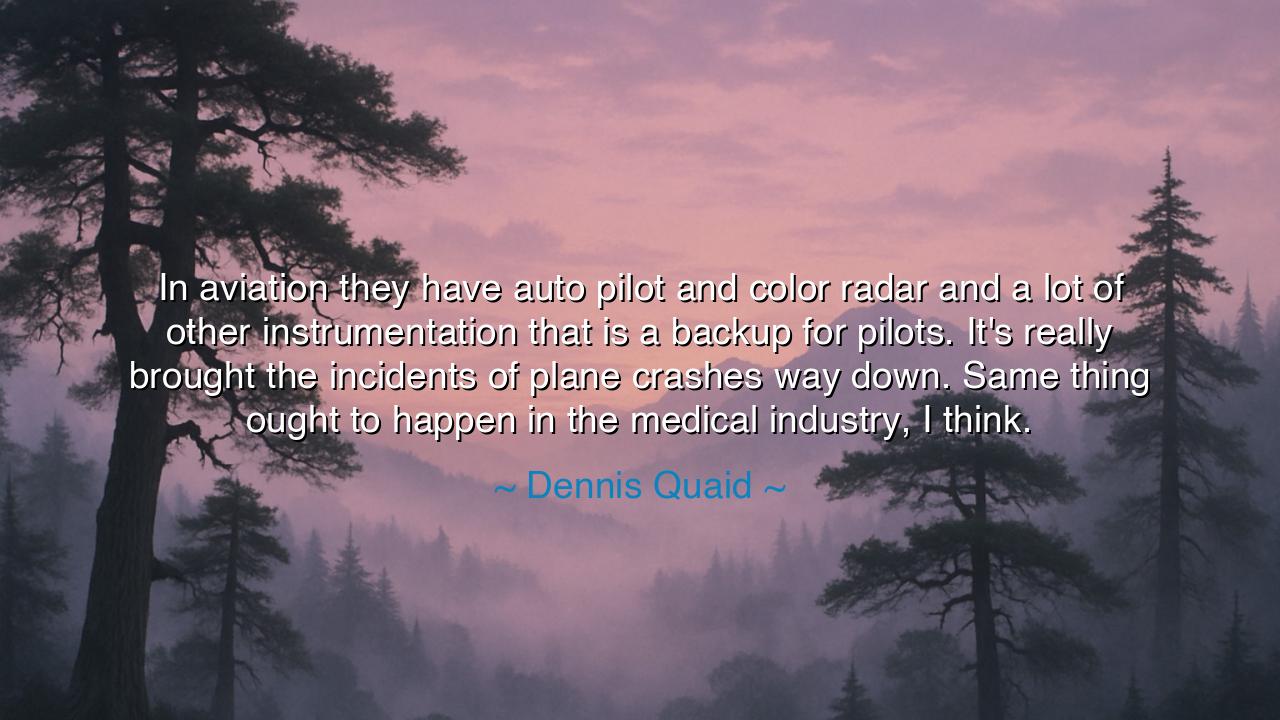
In aviation they have auto pilot and color radar and a lot of
In aviation they have auto pilot and color radar and a lot of other instrumentation that is a backup for pilots. It's really brought the incidents of plane crashes way down. Same thing ought to happen in the medical industry, I think.






The words of Dennis Quaid—“In aviation they have auto pilot and color radar and a lot of other instrumentation that is a backup for pilots. It's really brought the incidents of plane crashes way down. Same thing ought to happen in the medical industry, I think”—are not merely a reflection on technology, but a profound statement about human fallibility and the wisdom of building systems that protect against error. Beneath the practical observation lies an ancient truth: even the most skilled among us are vulnerable to fatigue, distraction, and mistake. To acknowledge this is not to show weakness, but to show humility before the limits of human nature.
In the ancient world, philosophers and engineers alike understood that great systems must anticipate human error. The Romans, who built aqueducts that lasted millennia, designed redundancies into their structures—channels and overflow paths, should one part fail. They knew that perfection was an illusion, but preparation was wisdom. Quaid, though speaking of modern technology, touches this same principle. The aviation industry, after decades of tragedy and study, learned to pair human skill with mechanical support—to weave judgment with precision, instinct with data. It was not the abandonment of human mastery, but the elevation of it through collaboration with machines.
The origin of Quaid’s insight is deeply personal. In 2007, his newborn twins were given an overdose of the blood thinner heparin—1,000 times the intended dose—due to a labeling error in a hospital. Though the children survived, the experience revealed to Quaid the fragility of the medical system. He saw that medicine, unlike aviation, had not yet embraced the discipline of fail-safe design. In the skies, a single pilot’s fatigue can be compensated by a co-pilot, an alarm, or a computer system that notices what human eyes miss. In hospitals, however, a misplaced decimal or an unread label can mean death. From his pain, Quaid drew not bitterness, but wisdom: that compassion and intelligence must be paired with structure and oversight if we are to protect life.
This idea—that technology should serve as a guardian of human life—is as old as civilization. The builders of the Egyptian pyramids devised ingenious checks for measurement and weight to prevent collapse. The shipwrights of ancient Greece designed watertight compartments to save sailors from the sea. Each of these was a kind of ancient “auto pilot”—a system to preserve life even when human hands faltered. The essence of Quaid’s message is not that machines should replace people, but that systems should reflect an understanding of human vulnerability. For when we prepare for imperfection, we show the highest form of wisdom: foresight born of humility.
There is a moral undercurrent here as well. Medicine, like aviation, is a field where lives hang in balance. In both, the practitioner must balance mastery with mindfulness. A pilot who scorns his instruments out of pride risks disaster. A doctor who scorns automation or oversight risks the same. Yet a wise pilot, like a wise healer, sees in these tools not an insult to skill, but an ally in the service of life. Ego must yield to empathy, for the ultimate goal is not to prove infallibility, but to preserve the fragile flame of human existence.
Consider the story of Dr. Atul Gawande, who introduced the surgical safety checklist—a simple system modeled after aviation procedure. At first, many surgeons resisted. They saw it as an intrusion into their autonomy. Yet, when the checklist was implemented, deaths and complications dropped dramatically around the world. The lesson was clear: discipline saves more lives than brilliance alone. The hero of the operating room is not the lone genius, but the humble practitioner who welcomes structure, collaboration, and accountability.
The lesson of Dennis Quaid’s words is not confined to hospitals or cockpits—it is a lesson for every craft, every leader, every human endeavor. Build your systems not upon pride, but upon the understanding that all hands may tremble. Surround yourself with safeguards born of foresight. Let wisdom, not arrogance, guide your design. For in every field—medicine, art, governance, or love—the path to safety lies in acknowledging that even the greatest among us need backup, and that true strength is not the denial of error, but the preparation for it.
So, my child, when you build—whether it be a bridge, a family, or a dream—build with redundancy, patience, and humility. Trust in human skill, but also in the quiet guardians that stand beside it: the checklist, the counsel, the second thought. For as Dennis Quaid reminds us, technology and structure, when guided by compassion, do not diminish our humanity—they protect it. And in that union of heart and reason, man’s most sacred duty—the preservation of life—finds its noblest expression.






AAdministratorAdministrator
Welcome, honored guests. Please leave a comment, we will respond soon